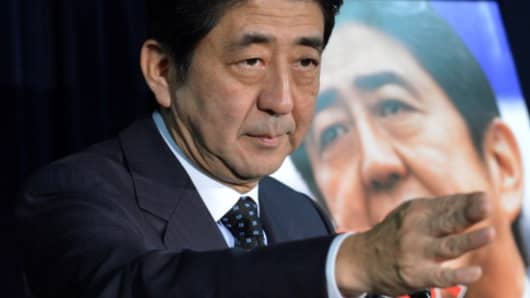Japan's incoming Prime Minister Shinzo Abe is slated to take office next week, but the country's central bank, which concluded its two-day policy meeting on Thursday, already appears to be dancing to the leader's dovish tune, analysts told CNBC.
The Bank of Japan (BOJ) increased its asset purchase and lending program by 10 trillion yen ($119 billion) to 101 trillion yen, expanding stimulus for the third time in the past four months, and also outlined plans to review its one percent inflation target at its next meeting on January 22.
As expected, the BOJ kept its overnight call rate target at a range of zero to 0.1 percent.
"The Bank of Japan can justify the move by pointing to the Tankan report (showing worsening business sentiment) but if there was no pressure from the politicians, it might not have moved today (Thursday). The BOJ is reacting to the pressure," Masafumi Yamamoto, chief forex strategist, Japan at Barclays told CNBC.
Abe's Liberal Democratic Party (LDP), which won Sunday's parliamentary elections in a landslide victory, securing a large majority in the lower house, has been a big proponent of aggressive monetary easing.
In his election campaign, Abe pledged to pressure the BOJ to prop up growth in the world's third-largest economy through stepping up monetary easing efforts and establishing
a 2 percent inflation target
. On Tuesday, the incoming leader said that he had asked Bank of Japan Governor Masaaki Shirakawa to consider adopting his inflation goal, Reuters reported.
(Read more: Aggressive Easing Wrong Medicine for Japan: Roach)
The economy, which has been struggling with deflation for around two decades, entered a mild recession in the third quarter after its key export sector was hit by weakening global demand. The latest tankan report released last week showed Japanese business sentiment worsened for a second straight quarter in the three months to December.
Nizam Idris, head of strategy, fixed income and currencies at Macquarie said the central bank's decision to reassess its inflation target next month indicates a willingness to move to a more aggressive stance in the fight against deflation.
While the BOJ reviews the inflation target on a regular basis, it typically does not signal intentions to do so a month earlier, Idris noted.
"If you compare this to their monetary policy statement last month, they are becoming less defiant. The BOJ isn't as protective about their independence as they were a month ago… I wouldn't rule out them adopting the 2 percent inflation target," he added.
According to Idris, Japanese monetary policy is now at a "cross roads." "This could be an inflection point where they turn decidedly more dovish and refuse to tolerate deflation," he said.
(Read more:
Japan's Deflation Battle – Why This Time Is Different
)
Mounting pressure on the Bank of Japan to ease policy has raised the question of the central bank's independence. Abe has threatened to revise a law guaranteeing BOJ's independence, if he cannot get the central bank to embark on bolder monetary stimulus.
While Sean Callow, senior currency strategist at Westpac Bank, said there is high probability of further easing action in the coming year, it is unlikely the central bank will formally raise the inflation target while current governor Masaaki Shirakawa is in power.
"I don't see why Shirakawa would change his tune. He has a few months left in his term. Inflation targeting will have to wait for a new governor."
Shirakawa's term is set to expire in April, and the government will appoint the new governor with approval from both houses of parliament.
"Shirakawa has been a roadblock for more aggressive easing. Abe will appoint someone of his mindset, so radical action will wait until a new governor," Callow said.



